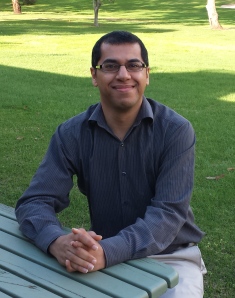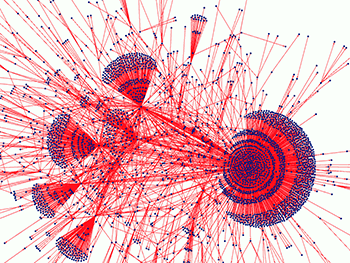* Can a machine learning algorithm shed light on the nature of grievances on Twitter?
* Can machine learning provide insightful information to forewarn policing and security agencies of imminent crimes, such as terrorist attacks, and thwart them?
 These are questions are posed and examined in a presentation at the Charles Sturt University (CSU) 2018 International Policing Conference in Sydney on Thursday 8 November.
These are questions are posed and examined in a presentation at the Charles Sturt University (CSU) 2018 International Policing Conference in Sydney on Thursday 8 November.
Researcher and lecturer in the CSU School of Computing and Mathematics Associate Professor in Information Technology Yeslam Al-Saggaf (pictured) explored these issues in his conference presentation ‘Expressing grievances in Twitter – a data science approach’.
Professor Al-Saggaf explained that machine learning is able to rapidly analyse vast amounts of data, discover patterns within them, and explain the reasons behind the emergence of those patterns.
“When applied to Tweets, for example, this enables the categorisation of information based on the language used (eg French, English, Arabic), location of the Tweeter (eg Yemen, France, UK), the number of Twitter ‘friends’ and ‘followers’, and the number of Tweets, replies, and re-Tweets,” he said.
“This data can then describe the network characteristics of the Tweeter and those they interact with, and ascribe a ‘tone’ to the interactions which may be, broadly speaking, benevolent or malevolent.
 “This is derived from ‘topic models’ which take into account contextual clues. A ‘topic’ contains a cluster of words that frequently occur together. Topic models can associate words with similar meanings and distinguish between uses of words with multiple meanings.
“This is derived from ‘topic models’ which take into account contextual clues. A ‘topic’ contains a cluster of words that frequently occur together. Topic models can associate words with similar meanings and distinguish between uses of words with multiple meanings.
“From this analysis it is possible to recognise the main themes within a conversation, offer justifiable explanations for the classification, and much more.”
The presentation featured detailed illustrations (an example left: 'The Twitter network of active users') of how the analytical tools provided insights into the mode of a group of people that would have been otherwise difficult to discover manually.
Professor Al-Saggaf said that the societal uptake of digital communication technology in the past decade had made it imperative that policing and security forces around the world stay abreast of developments and maintain a functional deployment of counter-measures to empower policing intelligence.
Associate Professor Al-Saggaf presented his paper ‘Expressing grievances in Twitter – a data science approach’ at 11.40am in the ‘Impacts of Technology’ concurrent workshop on Thursday 8 November at the 2018 CSU International Policing Conference in Sydney.
The CSU-hosted International Policing Conference 2018 is at Doltone House, Darling Island Wharf, at Pyrmont in Sydney on Wednesday 7 and Thursday 8 November.
Find out more about the conference here:
https://bjbs.csu.edu.au/schools/policing-studies/conference/international-conference





Social
Explore the world of social